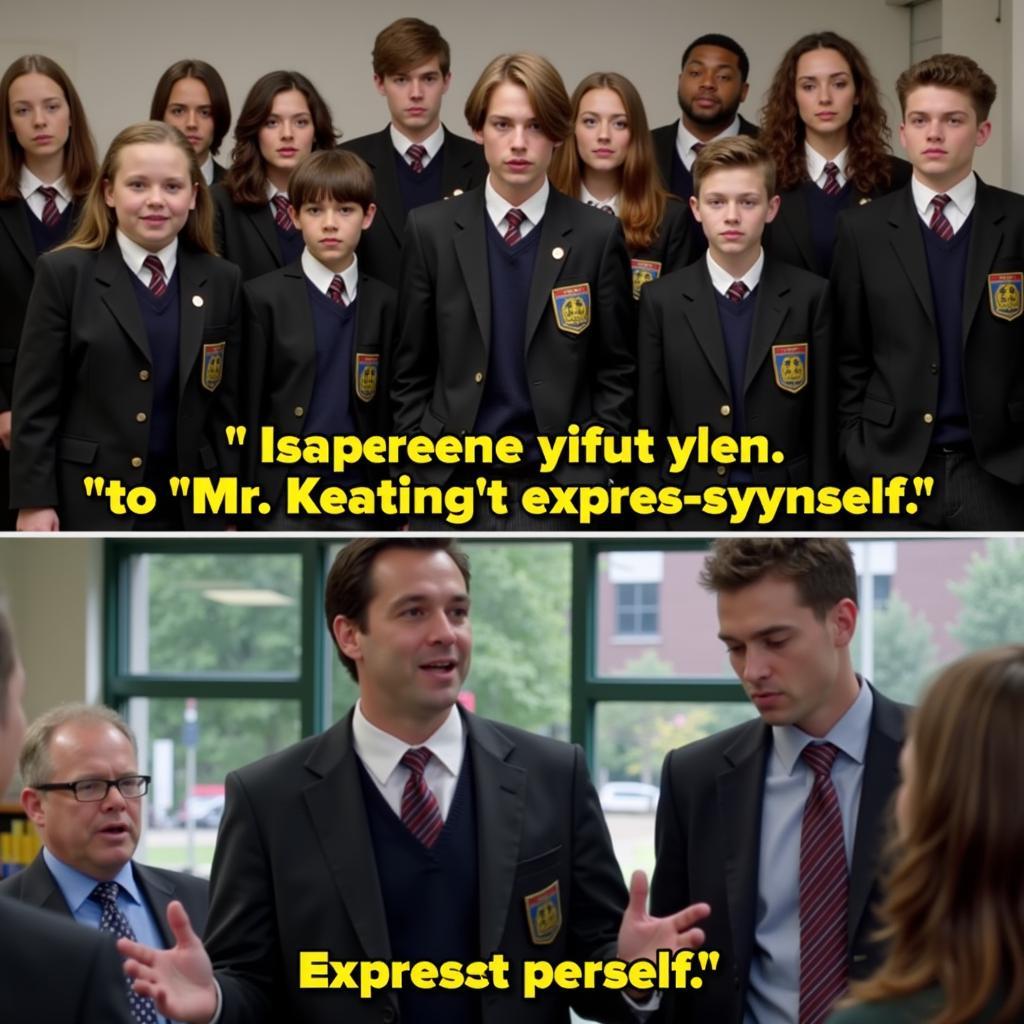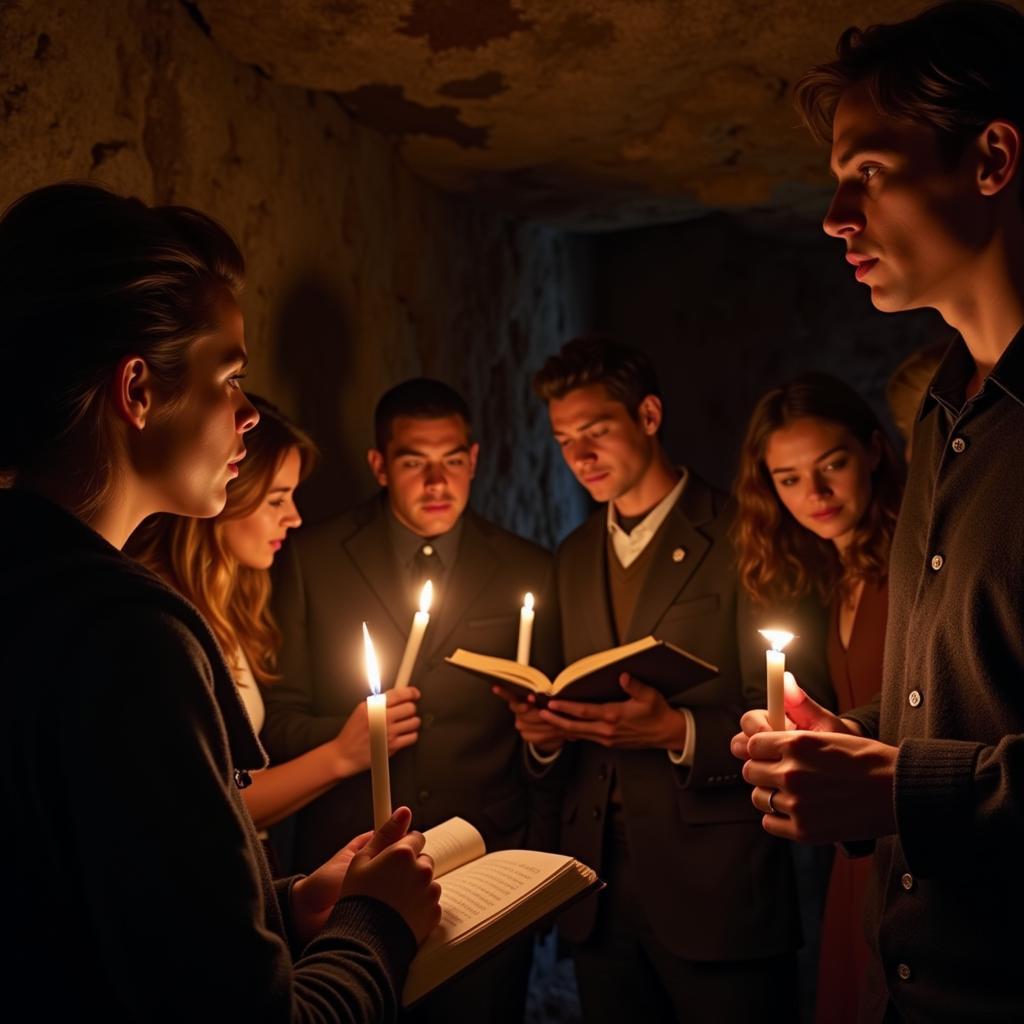Dead Poets Society, a film released in 1989, continues to resonate with audiences today, exploring powerful themes that remain relevant across generations. This thought-provoking story of Welton Academy’s students discovering the beauty of poetry and self-expression under the guidance of Mr. Keating challenges conventional norms and celebrates the importance of individuality. Let’s delve into the complex and intertwined Themes In Dead Poets Society.
Conformity vs. Individuality: A Central Conflict
One of the most prominent themes in Dead Poets Society is the struggle between conformity and individuality. Welton Academy, with its strict traditions and emphasis on “tradition, honor, discipline, excellence,” embodies the pressure to conform. Students are expected to follow a predetermined path, suppressing their own desires and passions. Mr. Keating, however, encourages his students to “carpe diem” – seize the day – and embrace their unique voices. He inspires them to question authority, think for themselves, and pursue their own dreams. This clash between societal expectations and personal expression forms the core of the film’s narrative. The boys’ journey to self-discovery is a testament to the power of individuality.
The film highlights the dangers of blind conformity, depicting how it can stifle creativity and lead to unhappiness. Neil Perry’s tragic fate serves as a stark reminder of the devastating consequences that can arise when individual expression is suppressed.
dead poets society viewing guide
We see the theme of individuality and conformity further played out in the diverse personalities of the Dead Poets Society members. Each boy grapples with the pressures of family expectations and societal norms in their own way. Knox Overstreet’s pursuit of Chris Noel, despite the apparent obstacles, exemplifies the courage to defy convention and follow one’s heart.
 Dead Poets Society: Conformity vs. Individuality
Dead Poets Society: Conformity vs. Individuality
Carpe Diem: Seizing the Day and the Power of Passion
“Carpe diem,” Mr. Keating’s mantra, becomes the rallying cry for the Dead Poets Society. It encapsulates the film’s message about the importance of living life to the fullest and embracing every moment. The boys discover the power of poetry, not just as an academic subject, but as a means of expressing their emotions, dreams, and fears. They find joy in challenging traditions, exploring their passions, and forging their own paths.
dead poets society the screenplay
What does “Carpe Diem” really mean? It’s about embracing the present and pursuing your passions with fervor. This theme encourages the boys to step outside their comfort zones, take risks, and make the most of their time. This is especially poignant given the restrictive environment of Welton Academy.
The Importance of Non-Conformity
Non-conformity, while sometimes viewed negatively, is presented in Dead Poets Society as a catalyst for growth and self-discovery. Mr. Keating challenges his students to question the status quo and think for themselves. He encourages them to stand up for what they believe in, even if it means going against the grain. This emphasis on non-conformity empowers the boys to explore their individuality and find their own voices.
“True individuality comes from challenging what’s expected and embracing your authentic self,” says Dr. Emily Carter, a renowned psychologist specializing in adolescent development.
 Dead Poets Society: Seizing the Day and the Power of Passion
Dead Poets Society: Seizing the Day and the Power of Passion
Tradition vs. Change: Navigating the Generational Divide
The conflict between tradition and change is another key theme in Dead Poets Society. Welton Academy, steeped in its long-standing traditions, represents the resistance to change. Mr. Keating’s unconventional teaching methods and encouragement of independent thought challenge the established order. This generational clash highlights the tension between preserving the past and embracing the future.
This clash is particularly evident in the relationships between the boys and their fathers. Neil Perry’s struggle to reconcile his passion for acting with his father’s rigid expectations underscores the painful consequences that can arise when tradition clashes with individual desires.
“Navigating the generational divide requires open communication and a willingness to understand different perspectives,” comments Professor David Miller, a sociologist specializing in intergenerational dynamics. “Dead Poets Society beautifully illustrates this complex dynamic.”
The Power of Poetry and Self-Expression
Dead Poets Society celebrates the transformative power of poetry and self-expression. Mr. Keating inspires his students to see poetry not as a dry academic subject, but as a means of connecting with their emotions, expressing their thoughts, and finding their own voices. He encourages them to embrace the beauty and power of language.
 Dead Poets Society: The Power of Poetry and Self-Expression
Dead Poets Society: The Power of Poetry and Self-Expression
Conclusion
Dead Poets Society explores timeless themes of conformity versus individuality, carpe diem, tradition versus change, and the power of poetry and self-expression. These themes continue to resonate with audiences today, reminding us of the importance of embracing our unique selves, pursuing our passions, and challenging the status quo. These themes in Dead Poets Society offer valuable lessons about the human experience and the importance of living a life true to oneself.
FAQ
- What is the main message of Dead Poets Society?
- What does Carpe Diem mean in the context of the film?
- How does the film explore the theme of conformity?
- What is the significance of the Dead Poets Society?
- Why is Dead Poets Society still relevant today?
- How does the film portray the relationship between tradition and change?
- What role does poetry play in the film?
For further information or assistance, please contact us at Phone Number: 02043854663, Email: [email protected], or visit our address at Zone 34, Bac Giang, 260000, Vietnam. Our customer service team is available 24/7.
You might also be interested in exploring other articles on our website, such as our Dead Poets Society Viewing Guide.